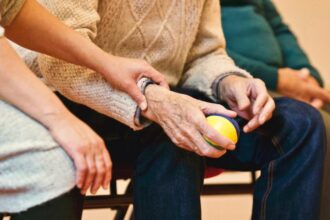Healthcare professionals have long struggled with the emotional conflict that comes with the death of a patient — it’s simple human nature to grieve when someone we have come to know passes away. While healthcare’s primary focus is on treatment and cure, learning to deal with death and dying is still an important part of a physician’s responsibilities.
Unfortunately in the healthcare field, showing grief for a patient’s death can be considered unprofessional and shameful — a sign of weakness. However, in reality, stoically bottling up emotions with the attitude of bravely soldiering on is neither healthy nor productive. So how can healthcare professionals overcome the stigma of grief in the healthcare field and appropriately deal with feelings of loss and even trauma incurred in the workplace?
Getting to Know the Problem
A 2011 study looked into how oncologists deal with patient loss by interviewing 20 oncologists from three Canadian hospitals. The results showed that the physicians struggled to balance their feelings of grief with the detachment they felt was necessary to carry out their job:
- Over half reported having feelings ranging from sadness to a sense of failure and powerlessness as part of their grief.
- A third mentioned feeling guilty, losing sleep, and crying.
- The majority kept these feelings to themselves for fear of being labeled as weak by their colleagues.
The results of unacknowledged grief have far-reaching implications on a physician’s ability to perform their job. The participant’s experienced irritability, burnout, and emotional exhaustion among other negative consequences. Additionally, half reported their experience with grief could affect their medical judgment with later patients. For example, they may call for more aggressive chemotherapy, recommend additional surgery, or include a patient in a clinical trial when palliative care might have been the best option.
In this attempt to forestall dealing with the possibility of future grief, the participants were essentially putting their own needs ahead of the patients.
Obviously, physicians have a difficult tightrope to walk when dealing with emotions. It’s important to express grief in healthy ways. On one hand, you can’t be too expressive as it can interfere with the job. No one, especially your next patient, wants to see an openly grieving doctor coming down the hall. On the other hand, keeping emotions bottled up is no good either, especially if the problem has evolved into more than just grief.
Depression and PTSD in Healthcare
In the worst cases, healthcare professional who consistently deal with death may develop depression. According to Matthew Green’s “A User’s Guide to the Most Common Mental Health Problems,” signs of depression include: “lasting feelings of despair and hopelessness; losing interest in activities you enjoy; tearfulness; severe depression can lead to suicidal thoughts.”
In fact, studies have shown that nurses experience depression at twice the rate of the general population, with 9 percent of general population experiencing clinical depression at any given time and 18 percent of nurses reporting the same.
Even worse, some healthcare professionals that operate in extremely violent and traumatic areas may suffer from PTSD, the symptoms of which are numerous but can include:
- Emotional numbness
- Loss of interest in things previously interested in
- Guilt and/or shame
- Short-term memory loss
- Anger
- Irritability
- Episodes of rage and aggression
- Tension
- Trouble sleeping
- Being easily startled
- Flashbacks
- Feeling constantly on edge
- Paranoia
- Hypervigilance
- Nightmares
- Frightening thoughts
- Feelings of isolation and detachment
- Trouble concentrating
- Feelings of being disconnected from oneself and others
A 2007 study in the American Journal of Respiratory and Critical Care Medicine found that 24 percent of ICU nurses and 14 percent of general nurses tested positive for symptoms of post-traumatic stress disorder.
So what are the strategies for dealing with these problems?
Coping With Grief, Dealing With Trauma
Unfortunately, there is no magic solution that will instantly make grief go away. These are simply feelings that healthcare professionals need to learn how to process and work through in their own way.
In many workplaces, tips for dealing with stress often include practicing mindfulness, which includes reminding yourself of where you are in-the-now and why you are there. The experts at Interim HealthCare write, of those coping with grief:
“First, they have to remind themselves of why they are there. Health care is a tough career that many people can’t handle. It took drive and a dedication for that person to get a job, and so struggling individuals must remind themselves of that drive. They may not be able to save everyone, but they do save plenty. After the loss of a patient it can be helpful to think of the next patient, who needs their care.”
They continue by mentioning that the most important part about experiencing grief is to do just that — experience it. Don’t ignore it, don’t bottle it up, and don’t hide it from your co-workers.
Some healthcare circles have begun implementing what’s called “Code Lavender” to deal with emotional distress, which allows physicians and nurses a holistic rapid response to emotionally stressful events. These include:
- Manual Therapies: Reflexive brushing, light massage, reflexology
- Energy–based Tools: Reiki, Healing Touch™
- Expressive Arts: Playing recorded music, singing, self-driven art, journaling, story telling
- Mind–Body Tools: Guided imagery, meditation, movement and breathing exercises, acupressure, holistic coaching
For more serious emotional problems, such as depression and PTSD, healthcare professionals should seek attention from a trained professional. PTSD and depression are no joke, can have negative effects on your career, and, most importantly, present major health and safety issues that you should seek help for if you are experiencing.
Overcoming the Stigma
Overcoming the stigma of grief in healthcare begins with understanding that healthcare professionals from all walks of life experience many of the same emotions, though they may experience them to varying degrees. The point is that you’re not alone.
Being a healthcare professional, while one of the most rewarding careers that you may find yourself in, is also one of the most challenging. By learning to deal and cope with the troublesome emotional aspects of the job, you’ll ensure that you’re able to remain a healthy contributing member of the healthcare community yourself and can continue to help others.










